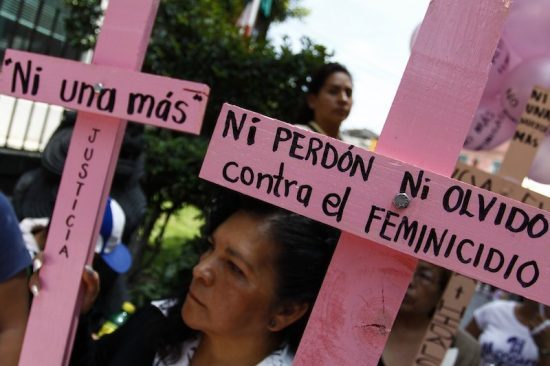All around the world women are fighting for basic human rights and equal opportunities. At the same time, honor killings, dowry-related femicide and intimate femicide have built an additional obstacle for women’s path to safety. México has been ravaged by a crisis of femicide and violence towards women since the mid ‘90s. More recently, women in the city of Puebla have been experiencing acts of femicide at record numbers.
Last month VICE’s Andalusia Knoll reported that 178 cases of femicide have been documented in Puebla since 2013 by a local NGO, Observatorio Ciudadano de Derechos Sexuales y Reproductivos A.C. They explained that these cases are occurring “three times more often today than they did at the turn of the decade.” In 2016 thus far, 29 cases have been reported. But these women will not allow themselves to be silenced.
Women from over 40 cities throughout México took to the streets this past week to demonstrate against the violence directed at women. Mexican society has been rooted in machismo or a patriarchal way of life going back many years. Traditionally, men are taught that they are the ones in charge. The man provides for his wife and family and has control over the household while the woman submits. However, women in México have never stopped the fight against this ideology.
Every day seven women are murdered in México according to the National Citizen Femicide Observatory. Newspaper headlines read of brutality towards women, broadcasters detail grisly scenes of violence and women are beaten, tortured and kidnapped to never be seen of again. Accompanied with the protests, México’s women brought the fight to Twitter where they voiced their own experiences and testimonies with hashtags such as #MiPrimerAcoso and #VivasNosQueremos.
Violence in México has the ability to persist because of one extreme problem crippling the country: impunity. According to the 2016 Global Impunity Index released by the Center for Impunity and Justice Studies (CESIJ), “less than 1% of crimes in México are punished.” Additionally, the Committee to Protect Journalists has documented that 91% of murder cases in México received complete impunity. This is to say that if someone is to commit a crime in México, especially a violent one, they’re almost guaranteed to get away with it. This is also made especially easy when government officials have all but denounced the problem.
Rafael Moreno Valle, the governor of Puebla, has been widely criticized by the citizens of Puebla for his response, or lack thereof, to the rising violence against women in the city. A petition on Change.org was initiated to try and convince the governor to take action. According to the Mexican news outlet Sin Embargo, “In the last two years, six cases of men not wanting to confront fatherhood and killing their pregnant girlfriends as a result have occurred.”
In 2016, the majority of femicide cases in Puebla have come against young pregnant women, often killed by their significant other. With abortion being almost entirely prohibited in the city, young people are not provided with many alternatives when becoming pregnant at a young age.
Consequently, this pressure often causes these young people to act irrationally and commit acts of murder against these women. If more outlets were set up for young people to turn to in times of premature pregnancy, it’s possible that the acts of violence committed against women would decrease. However, with these numbers increasing, many are wondering if the violence will spread to other states.
While Mérida and the Yucatan state have long been noted as the safest major city and state in México, as violence against women continues to be a nationwide problem and narco-violence continues to spread, there’s uncertainty about if and when the violence will spill over.
In 2014 we reported on two murdered women found in the state of Quintana Roo, one stabbed to death while the other was choked to death. More recently, the July 2015 murder of a 17-year-old girl in Umán, just 15 kilometers southwest of Mérida, had citizens fearful of a possible serial killer as investigators noted several similarities between this case and the case of a murdered woman in Valladolid in 2014. Violence against women occurs all over México, whether it is officially reported or not.
While Puebla has received headlines as of late for the spike of violence against women, make no mistake, this problem persists all around the country. It was Ciudad Juárez in the ‘90’s, Puebla City today, and it could be somewhere in the Yucatan next. Just like the brave women who took to the streets this week to make their voices heard, citizens of México need to stand up in support of the fight against machismo, hatred and social discrimination. Femicide is murder and young women are being killed, the time for action is now.
By Parker Asmann for TYT
Parker Asmann is a Chicago based journalist and a 2015 graduate of DePaul University with degrees in Journalism and Spanish, along with a minor in Latin American & Latino Studies. He is currently an Editorial Board Member for a bilingual Chicago based publication, El BeiSMan, where he focuses on issues of social justice and human rights. Parker has lived and studied in Mérida, Yucatán.



